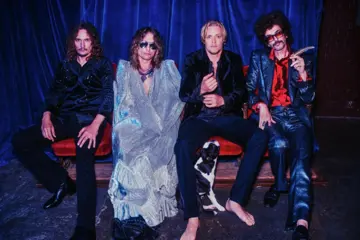Having been playing the Brisbane traps on and off for the past decades, you'd be excused for thinking you should know more about Fat by now. Now on their latest longplayer Blue Meets Black, the trio have managed to capture the rawness of their live shows while making full use of the studio to feed a fuller sound into some of their more elongated tracks, encapsulating Fat in all its growling glory.
Blue Meets Black begins with 90 Times A Day, a bolt of light in the gloom buffeted by '80s pub rock constructions, harking back to the earlier days. Chop and change has been Fat's unofficial MO, so we see the next two tracks veer in thrash territory – When Michael Jackson Died, a nihilistic stab that masks an idle idea of how death fails to stop the world, and Anxiety's schizophrenic whiplash punk – before the title track staggers away in a wild tangential shift towards dark psychedelia, complete with flute, The Queen Is Dead's sample leading into a piano-led lurking stalk, or Goodbye Good Luck's spiralling into stream-of-consciousness prog leanings. These songs can seem strange out of context, but work really well here to accentuate the ferocity of other tracks such as the roiling morass of When's It Gonna Rain? and the Jesus Lizard diseased march of I Can't Sleep. The musicianship throughout the album is excellent, with moments on the album held clear just to show off each individual proficiency. Rudi Weber's drumming is especially stunning, notably on Not Today.
Blue Meets Black is the perfect document for a band that have slaved away, burning down stages as they go, and will hopefully get them the recognition they rightly deserve.















